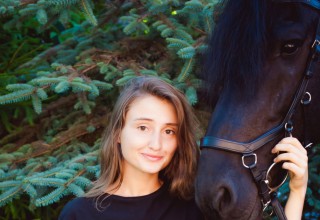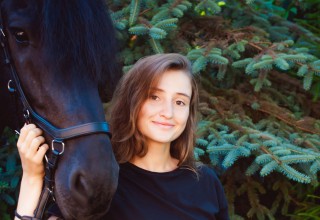Christina Inserillo From Boulder, Colorado Explains Nutritious Diets for Horses

BOULDER, Colo., August 31, 2017 (Newswire.com) - While attending the 15th Annual Mid-Atlantic Nutrition Conference, Christina Inserillo becomes heavily interested and invested in the topic of equine health and diet. Being a graduate student in the field of animal health and having a lifelong passion for horses, Inserillo decided to devote her career to helping horses and the studies of the animal.
As with all fauna, a healthy lifestyle which includes a balanced, nutritious diet and plenty of exercises contributes to overall health, and Inserillo aims to uncover exactly what a balanced, nutritious diet is for horses.
The basic principle of eating well and exercise, unsurprisingly, applies to animals.
Christina Inserillo
Inserillo aims to boost the overall health of animals around the world and her goal is to ensure that horses do not become susceptible to disease in the first place, by taking a proactive approach, rather than a reactive one.
"The basic principle of eating well and exercise, unsurprisingly, applies to animals," Inserillo adds. "Horses, in particular, are known for their susceptibility to certain illnesses like tetanus, sleeping sickness, influenza, rhino-pneumonitis, West Nile Virus, rabies, strangles, and arthritis is unfortunately not as uncommon as we would like."
During the conference in April where Christina Inserillo becomes interested in the subject further, she heard Lori Warren, Ph.D. PAS discuss the topic. Warren is the University of Florida's Department of Animal Science's main Equine Nutritionist. Warren pointed out that 70 percent of an animal's immune system is linked to its digestive system, which proves that health and food are intertwined.
To fully understand the importance of improving a horse's life, Inserillo says people need to learn what the horse's immune system is comprised of; their innate and adaptive systems. The innate system is present in all living creatures and continues to function throughout life. Meanwhile, the adaptive system develops as it is exposed to pathogens, learning how to fight them and remembering those lessons for the next time it encounters them.
According to Inserillo, boosting the adaptive system could be a great way to improve the overall immune system of horses. In fact, this is already done to a certain degree through vaccinations, which enhance the immune system but only for certain specific pathogens.
Christina Inserillo, together with experts such as Warren, are now pushing for more research to be conducted on probiotics and other foods that may improve equine digestive health.
There are many obstacles in the research though; mainly that scientists are hampered by an apparent inability to properly measure the immune system of a horse. The result is that it is equally just as difficult to measure whether certain foods have a positive or negative effect. Many experts have tried to come up with different ways in conducting research around these obstacles, hinting at studying diseased horses and different kinds of nutrition.
This doesn't satisfy Christina Inserillo because this would be reactive rather than proactive science, as her interest and goal lie not in healing horses, but in preventing them from getting sick in the first place.
But because of some progress in the research and understanding of nutritional needs of horses, the future does look promising. It has been found that pathogenic bacteria that reproduce in the gut of horses can be fought through functional fibers in oat hulls and beet pulp, which are rich in probiotics.
More needs to done, however. Inserillo adds that feeding a horse a healthy, balanced diet is common sense. However, determining what that consists of is much more difficult. As the field is still in its infancy, it's hard to determine exactly how foods that horses eat can fortify their immune systems.
"I truly believe the research and time studying these beautiful animals will help us understand them more, in-turn helping them live longer, healthier lives," she says.
Source: Christina Inserillo



